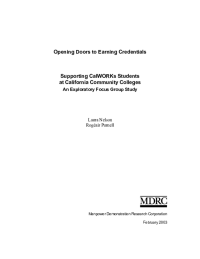Supporting CalWORKs Students at California Community Colleges
An Exploratory Focus Group Study
MDRC is launching an ambitious demonstration initiative called Opening Doors to Earning Credentials. Opening Doors is designed to help nontraditional students — at-risk youth, low-wage working parents, and unemployed individuals — earn college credentials as the pathway to better jobs with higher pay. This exploratory study investigated the challenges working low-income parents face as they pursued an Associate's degree or postsecondary credential, and it examined how comprehensive student services offered by the CalWORKs community college program affected students' persistence. Attention was paid both to the barriers that a sample of recipients of Temporary Aid for Needy Families (TANF) navigated and the supports they received while they pursued their educational goals at three community colleges in California. The results of this study have important implications for public agencies, community colleges, and policymakers who develop strategies and services that affect low-income parents' access to and persistence in the community college system.
Key Findings
- Focus group participants benefited greatly from the comprehensive services offered by the CalWORKs community college program and its staff, whom the participants described as knowledgeable and empathic. The academic, personal, career, and employment-related assistance provided by program staff helped many students persist in school, particularly during times of crisis or doubt. In addition to providing clear and consistent educational planning and counseling that allowed students to monitor their progress, staff also helped them navigate the community college system early in their tenure and connected them to other on-campus and off-campus services for which they were eligible. Without this assistance, some students felt that they may have forced to stop their coursework or drop out of school.
- Juggling the responsibilities of parenting, school, and work while satisfying requirements imposed by the county was an on-going challenge for many students. Some of these pressures were eased by the availability of good, stable child care and affordable housing; the support of family, peers, and employers; and by having clear educational plans. Participation in work-study provided students an opportunity to work on campus or in flexible positions with employers that were sensitive to the needs of working parents who were enrolled in school.
- Students did not have much opportunity to explore educational and career options or to enroll in and complete remedial classes that would help prepare them to begin a course of study. County rules allow TANF recipients 18 to 24 months to work toward their degree before they face sanctions on the adult portion of their grant. But time spent investigating alternative courses of study or taking remedial coursework often increased the amount of time focus group participants needed to complete their majors beyond the time permitted.






